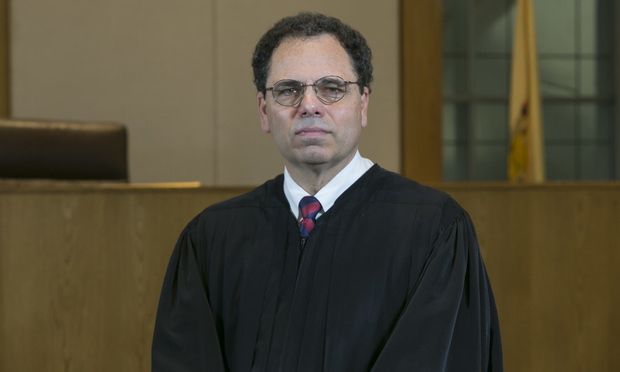Evidence Beyond 'Stockpiling' Required for Eminent Domain Redevelopment, Court Rules
"The mere inclusion of a parcel within a designated redevelopment area does not authorize that parcel to be taken on a whim at any time," the Appellate Division said in a published decision.
January 07, 2019 at 03:49 PM
5 minute read
 New Jersey Appellate Division Judge Jack Sabatino/photo by Carmen Natale
New Jersey Appellate Division Judge Jack Sabatino/photo by Carmen Natale
A New Jersey appeals court has ruled that a municipality or redeveloper whose condemnation of property in a redevelopment zone is challenged must articulate a definitive need that goes beyond the mere “stockpiling” of real estate.
In a contested eminent domain case, the condemning authority must present to the court some evidence—consisting of facts, expert opinion, or both—that sets out reasonable support for the need, the Appellate Division said Monday in Borough of Glassboro v. Grossman.
The court reversed a trial court's decision allowing Glassboro to acquire a piece of property after the town failed to offer any support for the assertion in its complaint that the land was needed for future public parking.
The ruling, which also vacated the trial court's appointment of condemnation commissioners to value the property, was made without prejudice so that Glassboro may file a new complaint with evidentiary support.
According to the court's decision Monday, Glassboro sought to acquire a one-acre plot one block from an ongoing, $450 million redevelopment project set to include retail space, apartments, student housing, classrooms and a park. The property at issue is within a redevelopment area that was designated by Glassboro in 2000.
The property at issue is owned by Jack Grossman and Matthew Roche, who entered into an agreement in September 2016 to sell it to Dan DeSilvio for $125,000. DeSilvio is buying the land in a series of installments though 2020. DeSilvio said he plans to construct residential, commercial and retail buildings on the site, the decision said.
But in January 2017, Glassboro filed a condemnation complaint against Grossman, Roche and DeSilvio, which stated that the acquisition was for “the specific purpose of increasing the availability of public parking” in Glassboro, according to the court.
The defendants argued that Glassboro failed to demonstrate a valid public purpose necessitating the acquisition. At a hearing on an order to show cause, Glassboro acknowledged that the complaint's asserted purpose of using the land for parking is only one possible use, and the property might be used for some other purpose related to redevelopment, according to the decision.
Gloucester County Assignment Judge Benjamin Telsey rejected Glassboro's argument that it could take any property within the redevelopment zone at any time, without providing a reason, but concluded that Glassboro had demonstrated an adequate public purpose to establish that the taking of the property at issue was necessary.
On appeal, the defendants—joined by the amicus curiae Institute for Justice, a public-interest law firm that focuses on property-rights cases—took the position that courts should strictly construe the Local Redevelopment and Housing Law, and that courts should not approve a redevelopment taking that is not supported by actual evidence of necessity.
Presiding Appellate Division Judge Jack Sabatino, joined by Judges Michael Haas and Thomas Sumners Jr., said in Monday's decision that the question of what evidential showing a condemning agency must provide when taking property under the Local Redevelopment and Housing Law creates tension between two values: flexibility in the redevelopment process and public accountability.
Sabatino, writing for the court, rejected Glassboro's position that necessity can be established under the statute solely based on the fact that the parcel to be taken is located in a zone designated for redevelopment. Such an approach disregards the statute's requirement that property under acquisition is “necessary” for a redevelopment project. The statute's necessity requirement “signaled that the mere inclusion of a parcel within a designated redevelopment area does not authorize that parcel to be taken on a whim at any time,” Sabatino wrote.
In addition, Sabatino said Glassboro erred in its argument that it could satisfy the necessity requirement under the statute merely by declaring the desire to stockpile a parcel for some possible future need in a redevelopment area.
“That sort of inchoate or speculative justification—aptly described by defendants as 'land banking' or 'land assemblage'—does not suffice to establish necessity under the statute,” Sabatino wrote.
The necessity requirement, if challenged, must be justified by a “reasonable presentation of supporting proof,” Sabatino wrote. That might include “discrete facts or data that reflect the need for the acquisition,” or “a report from an expert, such as a professional planner, engineer or traffic consultant.” Architectural plans, drawings, or a market study or economic forecast, or some combination of those, could also fulfill the government's obligations, Sabatino said.
R. William Potter of Potter and Dickson in Princeton, who represented the defendants, described the decision as “very significant” and said that the requirement that a condemning agency must have a specific project in mind when it takes land by eminent domain “provides a great deal of protection” to landowners.
M. James Maley Jr. of Maley Givens in Collingswood, who represented Glassboro, did not return a call about the ruling.
This content has been archived. It is available through our partners, LexisNexis® and Bloomberg Law.
To view this content, please continue to their sites.
Not a Lexis Subscriber?
Subscribe Now
Not a Bloomberg Law Subscriber?
Subscribe Now
NOT FOR REPRINT
© 2025 ALM Global, LLC, All Rights Reserved. Request academic re-use from www.copyright.com. All other uses, submit a request to [email protected]. For more information visit Asset & Logo Licensing.
You Might Like
View All
In 2-1 Ruling, Court Clears Way for Decade-Old Wrongful Imprisonment Suit
5 minute read

So Who Won? Congestion Pricing Ruling Leaves Both Sides Claiming Victory, Attorneys Seeking Clarification
4 minute readTrending Stories
- 1About Face: Court Takes Up Boeing Suit It Had Rejected
- 2Prosecutors Seek 15 Years in Prison for Ex-US Sen. Robert Menendez
- 3Attorneys ‘On the ‘Move: Morrison Cohen Expands White Collar Practice; O’Melveny Brings Back Corporate Finance Partner
- 4SEC Puts Beat Down on Ex-Wrestling CEO Vince McMahon for Not Reporting Settlements
- 5Discovery Seeks to Link Yale University to Doctor in Fertility Scandal
Who Got The Work
Michael G. Bongiorno, Andrew Scott Dulberg and Elizabeth E. Driscoll from Wilmer Cutler Pickering Hale and Dorr have stepped in to represent Symbotic Inc., an A.I.-enabled technology platform that focuses on increasing supply chain efficiency, and other defendants in a pending shareholder derivative lawsuit. The case, filed Oct. 2 in Massachusetts District Court by the Brown Law Firm on behalf of Stephen Austen, accuses certain officers and directors of misleading investors in regard to Symbotic's potential for margin growth by failing to disclose that the company was not equipped to timely deploy its systems or manage expenses through project delays. The case, assigned to U.S. District Judge Nathaniel M. Gorton, is 1:24-cv-12522, Austen v. Cohen et al.
Who Got The Work
Edmund Polubinski and Marie Killmond of Davis Polk & Wardwell have entered appearances for data platform software development company MongoDB and other defendants in a pending shareholder derivative lawsuit. The action, filed Oct. 7 in New York Southern District Court by the Brown Law Firm, accuses the company's directors and/or officers of falsely expressing confidence in the company’s restructuring of its sales incentive plan and downplaying the severity of decreases in its upfront commitments. The case is 1:24-cv-07594, Roy v. Ittycheria et al.
Who Got The Work
Amy O. Bruchs and Kurt F. Ellison of Michael Best & Friedrich have entered appearances for Epic Systems Corp. in a pending employment discrimination lawsuit. The suit was filed Sept. 7 in Wisconsin Western District Court by Levine Eisberner LLC and Siri & Glimstad on behalf of a project manager who claims that he was wrongfully terminated after applying for a religious exemption to the defendant's COVID-19 vaccine mandate. The case, assigned to U.S. Magistrate Judge Anita Marie Boor, is 3:24-cv-00630, Secker, Nathan v. Epic Systems Corporation.
Who Got The Work
David X. Sullivan, Thomas J. Finn and Gregory A. Hall from McCarter & English have entered appearances for Sunrun Installation Services in a pending civil rights lawsuit. The complaint was filed Sept. 4 in Connecticut District Court by attorney Robert M. Berke on behalf of former employee George Edward Steins, who was arrested and charged with employing an unregistered home improvement salesperson. The complaint alleges that had Sunrun informed the Connecticut Department of Consumer Protection that the plaintiff's employment had ended in 2017 and that he no longer held Sunrun's home improvement contractor license, he would not have been hit with charges, which were dismissed in May 2024. The case, assigned to U.S. District Judge Jeffrey A. Meyer, is 3:24-cv-01423, Steins v. Sunrun, Inc. et al.
Who Got The Work
Greenberg Traurig shareholder Joshua L. Raskin has entered an appearance for boohoo.com UK Ltd. in a pending patent infringement lawsuit. The suit, filed Sept. 3 in Texas Eastern District Court by Rozier Hardt McDonough on behalf of Alto Dynamics, asserts five patents related to an online shopping platform. The case, assigned to U.S. District Judge Rodney Gilstrap, is 2:24-cv-00719, Alto Dynamics, LLC v. boohoo.com UK Limited.
Featured Firms
Law Offices of Gary Martin Hays & Associates, P.C.
(470) 294-1674
Law Offices of Mark E. Salomone
(857) 444-6468
Smith & Hassler
(713) 739-1250







